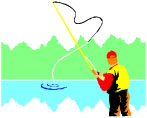- Chesapeake Sailing School with classes for adults and children: 301/261-2810 • www.sailingclasses.com.
- Annapolis Sailing School, where children and adults learn the ‘Annapolis Way’: 800/638-9192 • www.usboat.com/annapway.
- Womanship, where “nobody yells … everybody learns,” offers lessons for women, families, even men: 410/267-6661 • www.womanship.com.
- J World Sailing School: 410/280-2040 • www.sailworld.com.
- Trade Wind Yachts Annapolis: 410/267-9151. All offer instruction ranging from basic to advanced.
To find other sailors who understand your new obsession, try joining a club. Many local sailing clubs have full racing and social schedules.
- The Annapolis Yacht Club is famous for its Wednesday night races that send a cannon boom through downtown to signal the winners: 410/263-9279 • www.annapolisyc.org.
- Eastport Yacht Club is one of the area’s busiest clubs: 410/267-9549 • www.eastportyc.org.
- West River Sailing Club in Galesville welcomes all “boat owners who seriously pursue the sport of yachting under sail”: 410/867-9772 • sailingsource.com/wrsc.
Other clubs include the Chesapeake Bay Yacht Racing Association in Annapolis: 301/261-5296; the Maryland Capital Yacht Club in Annapolis: 301/261-2215; Severn Sailing Association: 410/269-6744 • www.clark.net/pub/ssa/; and Solomons Island Yacht Club: 410/326-3718.
Single sailors should try Singles on Sailboats for trips on the Bay with definite possibilities: 410/798-4098 • www.singlesonsailboats.org.
 42. Train for a Race
42. Train for a Race
Have you ever been to the health club in January? It’s exercise pandemonium. Crowds of people try to make those New Year’s resolutions come to life. Everyone is ready to take part in the fight against time and gravity. But as the January chills fade into spring breezes, the best intentions fail.
The problem is what are we training for? The games of youth have passed us by. That extra 10 pounds doesn’t bother us that much. What will motivate us, who will we compete against?
In the end we can really only compete against ourselves. That’s why running is the perfect outlet. We can push ourselves a little farther and a little faster. This summer, challenge yourself to take a run.
Pick a date. Find a race. In the meantime, run through the streets, find a trail, use a treadmill – and find a way to train for that race. Training for a race gives you structure and motivation to push yourself, far.
August 4: The Dog Day Cross Country 8k at the Anne Arundel Community College
August 25: The 27th Annual Annapolis 10-Mile Run
Both races are put on by the Annapolis Striders: www.annapolisstriders.org.
43. Be Somebody’s Hero — Be a Lifeguard
Looking for a job near the beach this summer? How about a job on the beach? The American Red Cross is reporting a national lifeguard shortage. If you are at least 15 and have good swimming skills, the Red Cross wants you. You’ll need to take their approved Lifeguard and CPR for Professional Rescuer course, offered at YMCAs throughout the state. The course is good for three years and is transferable between counties and states. Fees vary but will run about $200. Call the American Red Cross (800/777-6620 Delmarva branch) or your local pool for more information. Go ahead. Be buff. Be a hero.
 44. Dive into a Marine Museum
44. Dive into a Marine Museum
From prehistoric sharks’ teeth to draketail boats, the Chesapeake abounds with natural and human history — as well as with excellent marine museums to supply you a time machine.
At Solomons’ Calvert Marine Museum (410/326-2042; 10am-5pm daily; $6), you can travel back in time and learn about maritime history, paleontology and marine biology all in one trip. See all manner of historic boats, both fresh and salt water marshes and discoveries from the fossil-rich Calvert Cliffs. It’s also home to Calvert’s iconic Drum Point Lighthouse, a screwpile cottage open for daily tours (see Way 36). The jewel of the boat collection is centenarian buyboat Wm. B Tennison, which is still giving tours daily (except MTu) at 2pm.
For Southern Anne Arundel County history, visit the charming Captain Salem Avery House Museum, which the Shady Side Rural Heritage Society has restored and filled with exhibits on local history and culture (410/867-4486). The museum is open Sundays 1-4pm, but it’s busy many other times with shows, talks and exhibits of local history. Try on historical bathing suits, for example, and look for Civil War re-enactors once each month. Perennial summer favorites include the post-parade July 4 party for Shady Side with such old-fashioned delights as a baking contest.
Should you find yourself in the Maritime Republic of Eastport, Annapolis’ own secessionist city-state, stop into Annapolis Maritime Museum (formerly Barge House Museum) at McNasby’s Seafood House at the water end of Second Street. This museum documents and preserves the maritime and cultural history of Annapolis’ Eastport community. Thru summer, see the stories of Eastport’s African American community and of Annapolis yacht clubs. Sa 11am-4pm and Su 1-4pm: 410/295-0104.
On the Eastern Shore, visit the Chesapeake Bay Maritime Museum (Talbot County: 410/745-2916; 9am-6pm daily) in St. Michaels. Explore traditions in boat building, commercial fishing, yachting, waterfowling and navigation. See the 100-year-old screwpile Hooper Strait Lighthouse (see Way 36), the restored skipjack Rosie Parks and the log-bottom bugeye Edna E. Lockwood, a maritime library — and much, much more.
45. NJFK: Teach Your Dog to Love the Water
Stranded by the Bay with a dog from the desert? Tired of sweating like a pig, playing sheep for your Australian shepherd while your neighbors’ chocolate labs and Chesapeake retrievers fetch stick after stick from the cool blue water? Never fear — any dog can learn to be a water dog, with the right encouragement (even those that usually tiptoe, cat-like, across damp grass).
No, don’t throw your dog in the water. Take him to a beach where you can remove his collar (there’s such a beach at Quiet Waters) and leave him whining on the shore while you wade out a few yards. Turn your back on him and ignore him.
Remember, what your dog wants more than anything in the world is your attention — good or bad. Don’t give him any of either — don’t look at him or speak to him — until he sets foot in the water.
Once he does — even if he only takes three steps before he leaps back onto the beach — give him a word or two of praise. Then turn your back again. Praise him whenever he steps in the water, and ignore him whenever he steps out.
Don’t overdo it. Wait for him to step in the water two or three times, then wade back in. Lavish attention on your pup when you reach him; you want him to associate water with love and praise. Never, ever chastise him, even if he won’t go near the water that first day. Don’t coax him, either.
Go back the next day, or the next weekend, and do the same thing. Wade in the water and turn your back to your dog. Praise him as long as he stays in the water, but don’t move toward him; make him come to you. Be generous when he does — pat his flanks and say, ‘Good, boy.’
Once your dog looks comfortable wading, walk out a little deeper, until his feet leave the sand. He will panic and whip around like a rat leaving the Titanic. Shower him with praise and wait for him to try again. Wait another day if he refuses to budge; be patient until he overcomes his fear.
When your dog is swimming with some confidence, you can lead him around while he builds up his endurance. Remember, though, that dogs will push themselves past their limits to please their masters and can drown as a result. Watch for signs of fatigue and give your dog regular rest.
Dogs get dehydrated, even when swimming, and lapping salty Bay water only hastens the process. Always keep fresh water on hand for your dog to drink. You’ll also want an old towel or two in the car to dry his paws and lie across the back seat.
After your dog’s had some water and a rest, throw a stick down the beach for him. If you dog doesn’t know how to fetch, use the same sort of encouragement you did when you taught him how to swim. Once he’s chasing the stick and bringing it back to you, try throwing it in the water. Throw it in shallow water first, then deeper and deeper, until he has to swim for it. Hold your praise until he reaches the stick.
The day will come when you go to throw a stick and it slips from your hand and plops into the shallow water. Your former feline will wait patiently for you to try again, or fix you with a hurt stare and wade dutifully after it.
- Keep these tips in mind as you mold Prince into Mark Spitz:
- Be careful, especially around other dogs — some are very protective of their sticks.
- Be patient. Don’t expect your shepherd to become a retriever in a day, or even overnight.
- Be realistic. Your shepherd will never plow through the water like a lab.
- This method can also be used on jittery kids (though they probably won’t fetch any sticks).
46. Wet a Fly
Fly fishing has caught on in Chesapeake Country, winning the favor of anglers who set as much stock by the art of fishing as the good luck of catching.
 So popular is fly fishing nowadays that it’s joined spincasting as a charterable Bay sport. And that’s a good thing. For beginners, there’s a shock in store in the length and lightness of the rod. And when you cast all that line with no weight to give substance to its fall, it’s likely to fall in a tangle as if it were Silly String.
So popular is fly fishing nowadays that it’s joined spincasting as a charterable Bay sport. And that’s a good thing. For beginners, there’s a shock in store in the length and lightness of the rod. And when you cast all that line with no weight to give substance to its fall, it’s likely to fall in a tangle as if it were Silly String.
Hook up with one of these captains, and you’ll learn not only the wrist action to tame that long line but also how to manage it by boat on our beautiful Bay. All gear is provided, so beginners will learn what to buy before getting tangled in confusion at a sporting goods store.
You can’t do better than booking your trip with Bay Weekly’s own outdoors columnist Capt. C.D. Dollar on Osprey Expeditions (410/827-0786 or 410/991-8468 on the water • [email protected]).
Capt. Dollar also recommends Capt. Joe Evans (410/280-2046 • [email protected]) and
Capt. Bo Toepfer on Witch out of Solomons (800/303 4950 • [email protected]).
47. See Plebe Parade at the Naval Academy
The Fourth Class Regiment stands at attention in white works where the Brigade of Midshipmen normally marches in full dress blues.
It’s Plebe Summer, and while the rest of the Brigade is in the Fleet for professional training, the new freshman — or plebes — are undergoing their indoctrination to Academy life.
The plebes are serious, scared and determined. They worry about every misstep and want to perform perfectly, but their uniforms don’t quite seem to fit.
Go see these young men and women parade across Worden Field as they struggle to leave behind their civilian ways and become midshipmen.
For a schedule of events at the Naval Academy call the Public Affairs Office, 410/293-2291, or check out the Schedule Page on the Academy’s website, www.usna.edu.
 48. Pet a Llama
48. Pet a Llama
As I approached my 40th birthday, I told my husband point-blank my preferred festivity: “I want a party in the llama barns at Homestead Gardens. I can take a llama ride and get my photo taken with one.” Alas, my birthday is in February, not a good month for a semi-open air party, and I somewhat exceed a poor llama’s cargo capacity.
Homestead’s llamas seem to be the most public, but they are certainly not alone in Bay Country. Worlds away from the Andes and from their cousins, the camels, in Asia and Africa, llamas have decidedly established themselves here. The website of the Llama Association of the Mid-Atlantic States shows six registered llama herds in Southern Maryland alone, and my wanderings through the area yielded at least one other. A few other herds are spread out on the Eastern Shore.
I bet you can name a llamery or two, too, tucked away in domestic corners of Chesapeake Country where who’d expect a South American beast to roam.
Bred for their fine wool, companionship, trekking and herding — not to mention the status of owning a llama or two and the price they fetch — llamas are now fixtures at county and state fairs and countless festivals around the Bay, especially during spring and fall.
Before they become so commonplace, visit the Homestead llamas in their barn on Route 214 (Central Ave.) in Davidsonville, where you can watch them being fed and groomed. The llama staff is happy to answer your questions, point out the newcomers to the herd and instruct you in the ways of llama etiquette. Curious and quiet, these graceful animals seem to smile at the onlookers who smile at them. (Open daily 10am to 3pm.)
And yes, you can schedule a birthday party there, but it’s best if you’re toddler-sized.
49. Brew a Pitcher of Garden Tea
Now’s the time to use your great-grandmother’s silver iced-tea spoons and your grandmother’s iced-tea glasses. For iced tea is the drink of summer.
Instant tea was a bad dream. Bottled tea is a waste. There’s nothing simpler to make or more refreshing to drink than iced tea. You don’t even need tea leaves or tea bags, which is just as well, as they’re getting pricier as they get trendier.
Step out to the herb garden quickly, before lemon balm and mint take it over. What? You don’t have an herb garden? Buy a pot of mint, put it outdoors in the sun and watch out. Soon you’ll see why you need to drink lots of herbal tea.
Snip off a handful of branches. Rinse them. Toss them in a tea pot and cover with boiling water. Five or 10 minutes later, strain into a pitcher, pouring the hot tea down the length of a silver iced-tea spoon: that’s how grandmother kept her glass pitcher from cracking from the heat.
Squeeze in half a lemon. Add a bit of sugar or honey. Pour into tall glasses filled with ice (remember the teaspoon trick). Garnish with more mint. Ahhhh, that’s cool.
Once you start, garden tea will become a habit. Experiment. Buy plants of spearmint or chocolate mint (but probably not catmint) from your herbal nursery. They’re hardy and will return to urge you to drink more garden tea next summer.
50. NJFK: Go on a Photographic Expedition
“Imagine you’re going to shoot a cover for Bay Weekly,” says Phil Hoffmann, team photographer for the Naval Academy Athletic Association, Baltimore Ravens and Baltimore Bayhawks. “The editor has assigned you the job of capturing one picture that sums up Annapolis, or the local architecture, or living on the shores of the Chesapeake Bay.”
This technique is called “self-assignment” and it’s used by professional and amateur photographers to improve their skills or expand their areas of expertise.
On self-assignment in Annapolis, Hoffmann started at City Dock. For a scenic photo, he advises including a foreground element. He focused on one boat tied up at the dock, including a nearby piling to give the picture perspective. A small aperture setting maximized depth of field, so that all objects in the photo, no matter their distance from his camera, would be in focus.
A couple dining at a sidewalk café were his next subjects. This picture needed a shallow depth of field so the couple and their table would be in focus with the background slightly out of focus. He avoided the bull’s-eye effect by not centering the couple in the picture.
Hoffmann’s next assignment was to contrast historic Annapolis with the bustle of modern life. He went to Church Circle to photograph St. Anne’s Church. Standing on the outside of the circle, he used a slow shutter speed, which would clearly capture the church yet would blur the passing traffic. When photographing buildings, Hoffmann says be sure to keep the sides of the frame parallel to the sides of the building or else the building will look like it’s leaning in the picture.
You might want to imagine that a visitor has come to your hometown and asks you what it’s like to live there. You’re allowed to show the visitor only one picture. What would it be?
Or try to capture one picture that sums up your family or your dog or the birds splashing in the bird bath. Now get out there on assignment.